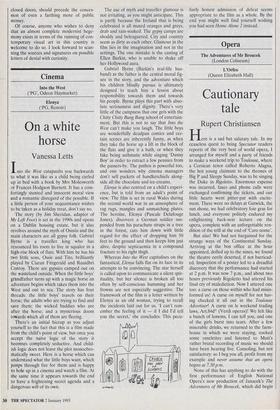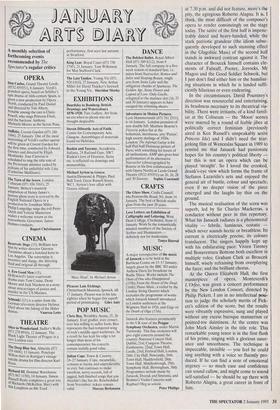Opera
The Adventures of Mr Broucek (London Coliseum) L'Orfeo (Queen Elizabeth Hall)
Cautionary tale
Rupert Christiansen
Here is a sad but salutary tale. In my ceaseless quest to bring Spectator readers reports of the very best of world opera, I arranged for myself and a party of friends to make a weekend trip to Toulouse, where a Corsican tenor called Roberto Aiagna, the hot young claimant to the thrones of Big P and Sleepy Sunday, was to be singing the Duke in Rigoletto. Enormous expense was incurred, faxes and phone calls were exchanged confirming the tickets, and our little hearts went pitter-pat with excite- ment. There were no delays at Gatwick, the sun shone, we had celebratory foie gras for lunch, and everyone politely endured my enlightening back-seat lecture on the opera, complete with an unforgettable ren- dition of the trill at the end of 'Caro nome'.
But alas! We had not bargained for the strange ways of the Continental Sunday. Arriving at the box office at the hour appointed, dolled up to the nines, we found the theatre eerily deserted, if not barricad- ed. Inspection of a poster led to a dreadful discovery that the performance had started at 2 p.m. It was now 7 p.m., and about two hours previously Rigoletto had uttered his final cry of malediction. Now I uttered one too: a curse on those within who had misin- formed us! A curse on myself for not hav- ing checked it all out in the Toulouse Advertiser! A curse on le weekend trading laws, Art.84d* (Verdi operas)! We felt like a bunch of lemons, I can tell you, and one of the girls burst into tears. After a few miserable drinks, we returned to the farm- house in which we were staying, cooked some omelettes and listened to Muti's rather brutal recording of music we should have been hearing live. Consoling, but not satisfactory: so I beg you all, profit from my example and never assume that an opera begins at 7.30 p.m.
None of this has anything to do with the first performance of English National Opera's new production of Janacek's The Adventures of Mr Broucek, which did begin at 7.30 p.m. and did not feature, more's the pity, the egregious Roberto Alagna. It is, I think, the most difficult of the composer's opera to render convincingly on the stage today. The satire of the first half is impene- trably dated and heavy-handed, while the stark patriotic grandeur (the idiom subse- quently developed to such stunning effect in the Glagolitic Mass) of the second half stands in awkward contrast against it. The character of Broucek himself contains ele- ments of Falstaff, Pooter, Jorrocks, Mr Magoo and the Good Soldier Schweik, but I just don't find either him or the humiliat- ing situations in which he is landed suffi- ciently hilarious or even endearing.
In the circumstances, David Pountney's direction was resourceful and entertaining, its brashness necessary to its theatrical via- bility. There were irritants, of a kind famil- iar at the Coliseum — the 'Moon' scenes were marred by a round of feeble jibes at politically correct feminism (previously aired in Ken Russell's unspeakably sexist Princess Ida) and I didn't need the tear- jerking film of Wenceslas Square in 1989 to remind me that Janacek had passionate hopes for his country's political liberty — but this is not an opera which can be played 'straight'. So I loved the crooked, drunk's-eye view which forms the frame of Stefanos Lazaridis's sets and enjoyed the general air of bustle, colour and spectacle, even if no deeper vision of the piece emerged and the laughs lay thin on the ground.
The musical realisation of the score was superb, led by Sir Charles Mackerras, a conductor without peer in this repertory. What his Janacek radiates is a phenomenal vitality — febrile, luminous, ecstatic — which never sounds hectic or breathless. Its current is electrically precise, its colours translucent. The singers happily kept up with his exhilarating pace: Vivien Tierney and Bonaventura Bottone both excellent in multiple roles; Graham Clark as Broucek himself, wisely refraining from overplaying the farce; and the brilliant chorus.
At the Queen Elizabeth Hall, the first masterpiece of opera, Monteverdi's L'Orfeo, was given a concert performance by the New London Consort, directed by Philip Pickett. I am in no intellectual posi- tion to judge the scholarly merits of Pick- ett's edition of the score, but the results were vibrantly expressive, sung and played without any excess baroque mannerism or pointed-toe daintiness. At the centre was John Mark Ainsley in the title role. This remarkable young tenor is in the first flush of his prime, singing with a glorious assur- ance and smoothness. The technique is impeccable, invisible — you feel he could sing anything with a voice so fluently pro- duced. If he can find a note of emotional urgency — so much ease and confidence can sound callow, and might come to sound self-satisfied — he should be up there with Roberto Alagna, a great career in front of him.











































 Previous page
Previous page